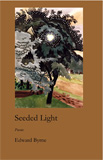May 5, 2010SEEDED LIGHT
Review by Barbara Crooker
Turning Point
PO Box 541106
Cincinnati, OH 45254
ISBN 9781934999783
2009, 102 pp., $18.00
www.turningpointbooks.com
Seeded Light, Edward Byrne’s sixth collection of poetry, takes its title from a quote by Pablo Neruda, “The immense deserted night set up its formation of colossal figures that seeded light far and wide,” and the different qualities and forms that the light takes are the heart of these poems, graceful and musical lyrics set in flexible couplets which take us on journeys to places as far flung as Curacao; Lisbon; Fayette County, West Virginia; the White Mountains of New Hampshire; the Colorado Rockies; Wyoming; Wildwood, NJ; LeHavre, France.
A number of other themes also thread throughout this book: journeys, explorations, travel; love and loss. Look at the number of participles in the titles alone: waiting, burning, returning, leaving (3 poems), sailing, envying, awaiting, descending, listening, invoking, and rafting. All of these imply an action, one that is ongoing, and Byrnes adds to this with his use of the second person, inviting the reader to participate: “We leave, believing we’ll never return again” (“Returning to Your Father’s Farm”). There is also a sense of invocation as well as invitation. Byrnes wants us to come along, to see the “Church Burning,” the “Wharf at Sunset,” the “Rainbow over Snow-Covered Landscape,” “Winter Nightfall in a Seaside Village,” or to spend “Easter Weekend: Sunrise by the Bay.”
But the theme that runs strongest in the book is light, in all its varieties. There’s starlight, “that nightly slide of stars” (“Mountain Meadow: Night Climb After a Storm”); moonlight, a “gibbous moon . . . now rising // like an ivory fan” (“Constellations Over Colorado”); sunrise, that “rubs its colors across slim clouds” (“Easter Weekend: Sunrise by the Bay”); noonday sun, whose “glare appeared imperial, sovereign over everything” (“Curacao: Notes from a Summer Memoir”); a rainbow, “smear across / our frosted windshield” (“Rainbow over Snow-Covered Landscape”); forest fires and lightning, “flames flowered along each / ridge” (“Lightning Strike”); and artificial light: lamplight, candlelight, traffic lights, neon signs.
my window, where aligned hundred-watt
bulbs of house security lights are now
shimmering and shining up from those
shallow puddles offering their own brightreflections as guides in the dark, replacing
this night’s sleep far array of missing stars.
(“Revision by Lamplight”)
Indeed, this book contains a whole vocabulary of light.
In Byrne’s landscapes, there’s a sense of the ephemeral, a sense that all of this is passing away before our eyes. Those stars shine with “light from times already passed” (“Rafting the Rapids”). And as time passes, he confronts a litany of losses: when love goes astray (“Night Vision,” “After Leaving the Hotel,” “Constellations over Colorado”), loss of a parent (“Wyoming Elegy”), the losses inherent in the titles: “After the Miscarriage,” “Coronary Thrombosis,” “After the Aneurysm,” “Spring Sunset: Learning About the Death of a Friend”; the jazz and blues melancholy in the echoes of Lester Young backing Billie Holliday, “I tried somehow / to take into account how far apart we already were” (“Listening to Lester Young”).
This constant awareness of the passage of time and the shifting of relationships give the poems a deeper emotional resonance, and the tonal quality of elegy:
. . .And yet, today only one
thing matters: somewhere under the enormous
summer sky of Wyoming spreading
over everything, where even this wild river
threading its way through the moonscape
territory before us will soon have begun to run
dry, that woman, who once knew how to love
all the small wonders of her world, now lies still
(“Wyoming Elegy”)
But although there is darkness present in this collection, a love that’s “come undone,”(“After Leaving the Hotel”) whether by illness, suffering, or death, there is always light, from the slimmest of glimmers to full moony illumination, and it is that light, seeded throughout, that we will remember, long after we close the pages and turn off the lamp.